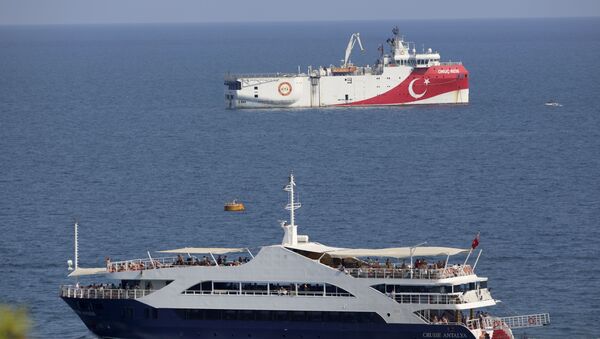"France, Greece, and Greek Cyprus are working on the idea of sanctions. Other countries have not supported [it]. I am not expecting sanctions, although such a possibility remains. There are countries within the EU, which do not support them [sanctions]. Such a decision must be adopted unanimously," Cavusoglu told the Turkish NTV broadcaster.
The minister described the EU as being taken hostage by Greece.
"What are they trying to achieve? That we would abandon our rights? No, on the contrary, we have become even more determined. The EU has to decide: they will either be with Turkey or pander to a pampered country," he added.
Tensions in the Eastern Mediterranean have been brewing for many months around Turkey's exploration for gas in waters that Cyprus and Greece claim as their exclusive economic zones. The situation was exacerbated this summer, as Turkey sent the Oruc Reis ship, accompanied by a fleet of military vessels, to drill in what Greece considers its continental shelf.
On Sunday, the Turkish Oruc Reis research vessel was reported to have left the disputed area for its base near Turkey's Antalya amid increasing tension in the region. Earlier last week, the seven Mediterranean EU members, including France and Greece, confirmed their readiness to sanction Ankara if it does not resume dialogue and persist in conducting allegedly unilateral activities in the Eastern Mediterranean, during the MED7 summit in Corsica.
Turkey's Seismic Survey in Mediterranean
Turkey's agreement with Libya on receiving the Mediterranean waters that Greece considers part of its exclusive economic zone is retaliation to Greek, Cypriot and Israeli actions in the region, which were taken without considering Ankara's interest, Turkish Foreign Minister Mevlut Cavusoglu said.
"Greece and Cyprus signed agreements with Israel [on the EastMed gas pipeline project], in which they ignored our interests. But when we signed an agreement with Libya, there were immediate accusations. Our activities in the Eastern Mediterranean are a response to the front that lined up against us. Why are they ignoring Turkey and creating tensions that nobody benefits from instead of sharing the sea and winning?" Cavusoglu said on the NTV broadcaster's television channel.
The top diplomat added that two of Turkey's drillships, Yavuz and Barbaros, were carrying on with their missions, while the Oruc Reis vessel went under maintenance.
Cavusoglu went on to say that the European Union was unlikely to impose sanctions on Turkey over the maritime dispute.
"France, Greece and the Greek Cypriots want sanctions. The [EU] bloc may make a decision on Sept. 24-25 to impose sanctions, which I do not expect, but could also take place. Similar things have happened in the past," the foreign minister said, as cited by the Turkish Daily Sabah newspaper.
As Turkey's Oruc Reis research vessel began drilling in Greek-claimed waters in the Mediterranean in mid-August, Greece mobilised its armed forces to high alert and vowed to protect its sovereign rights by all necessary means, including militarily.
In late November 2019, Libya's Government of National Accord signed with Turkey the memorandum of understanding on military cooperation and a new maritime border in the Eastern Mediterranean Sea. Under the deal, Ankara is to appropriate a lion’s portion of waters between Turkey and Libya in the Mediterranean, claimed also by Greece and Cyprus.


